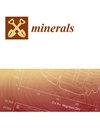Preparation of Oxidized Pellets from Sulfuric Acid Residue Containing Zinc and Lead by Chlorination Roasting and Its Mechanism of Dezincing and Lead Removal
IF 2.2
4区 地球科学
Q2 GEOCHEMISTRY & GEOPHYSICS
引用次数: 0
Abstract
The utilization of sulfur acid residue is an urgent problem confronting sulfuric acid production enterprises, especially the application of sulfur acid residue (SAR) containing lead and zinc. A method combining chlorination roasting using CaCl2 with pelletizing for processing SAR containing lead and zinc was used in this study, and the effect of calcium chloride on pelletizing performance was studied; in addition, the removal behavior of lead and zinc was also studied by using polarized light microscopy (Zeiss double Axioskop 40A), X ray diffraction, SEM and EDS. The results showed that CaCl2 migrated to the surface of the pellets during drying, and this phenomenon resulted in a lower removal rate of lead and zinc inside the pellets than outside the pellets during the preheating phase. When the roasting temperature was 1220 °C, with an increase in the basicity of pellets, the silicate minerals in the pellets gradually decomposed, the hematite particles were gradually refined, and more lead or zinc minerals were exposed, which further increased the removal rate of lead and zinc in the pellets. Finally, the SAR pellets with Pb and Zn removal rates up to 91.33 and 97.88%, and a compressive strength of 2789 N, could be obtained, which is very beneficial to the sustainable development of sulfuric acid mills.利用氯化焙烧从含锌和铅的硫酸残渣中制备氧化颗粒及其脱锌和脱铅机理
硫酸残渣的利用是硫酸生产企业亟待解决的问题,尤其是含铅和锌硫酸残渣(SAR)的应用。本研究采用 CaCl2 氯化焙烧与造粒相结合的方法处理含铅和锌的硫酸渣,并研究了氯化钙对造粒性能的影响;此外,还利用偏光显微镜(蔡司双 Axioskop 40A)、X 射线衍射、扫描电镜和 EDS 研究了铅和锌的去除行为。结果表明,CaCl2 在干燥过程中迁移到颗粒表面,这一现象导致在预热阶段,颗粒内部铅和锌的去除率低于颗粒外部。当焙烧温度为 1220 ℃ 时,随着球团碱性的增加,球团中的硅酸盐矿物逐渐分解,赤铁矿颗粒逐渐细化,更多的铅或锌矿物暴露出来,这进一步提高了球团中铅和锌的去除率。最后,可获得铅和锌去除率高达 91.33% 和 97.88% 的 SAR 球团,抗压强度为 2789 N,这对硫酸厂的可持续发展非常有利。
本文章由计算机程序翻译,如有差异,请以英文原文为准。
求助全文
约1分钟内获得全文
求助全文
来源期刊

Minerals
MINERALOGY-MINING & MINERAL PROCESSING
CiteScore
4.10
自引率
20.00%
发文量
1351
审稿时长
19.04 days
期刊介绍:
Minerals (ISSN 2075-163X) is an international open access journal that covers the broad field of mineralogy, economic mineral resources, mineral exploration, innovative mining techniques and advances in mineral processing. It publishes reviews, regular research papers and short notes. Our aim is to encourage scientists to publish their experimental and theoretical results in as much detail as possible. There is no restriction on the length of the papers. The full experimental details must be provided so that the results can be reproduced.
 求助内容:
求助内容: 应助结果提醒方式:
应助结果提醒方式:


